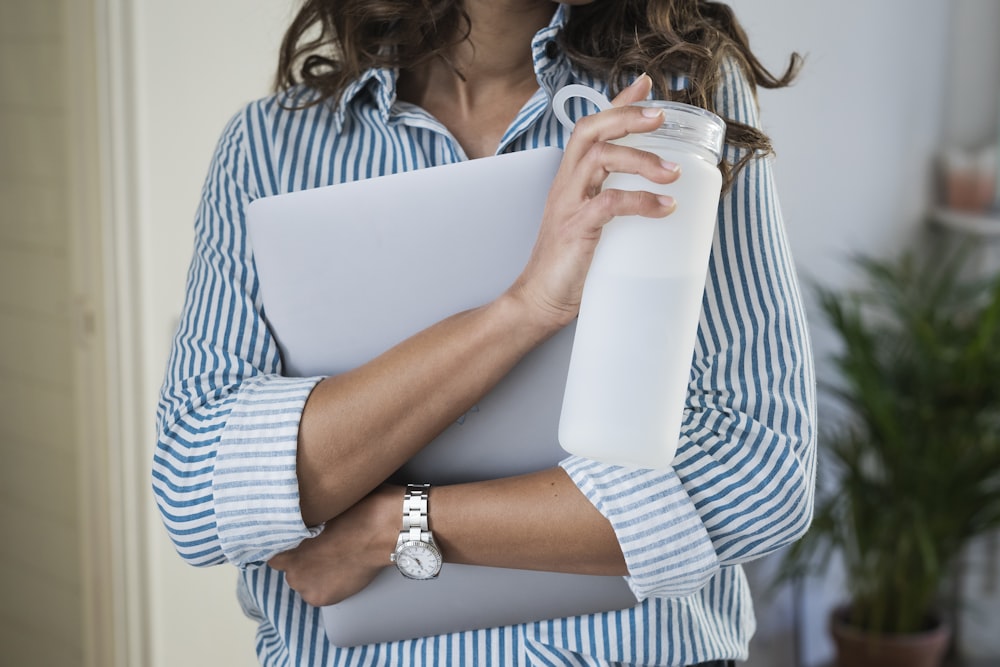Dehydration is a condition that occurs if there isn’t enough water in the body. The body's system is unable to function properly without water and can experience severe, moderate, or mild dehydration, depending on how much water has been lost.
Dehydration can occur for a number of reasons other than not drinking enough water.
Water loss generally occurs in the body from sweating, peeing, breathing, tears and saliva.
Here are some common ways water can be lost excessively from the body:
- Frequent urination- This can be for a lot of reasons like taking diuretics, blood pressure medications, alcohol, antipsychotics, antihistamines, and diabetes)
- Fever
- Diarrhea- The small intestines usually absorb water. When it can’t, you pass it out in your stool and become dehydrated because the water was unable to be absorbed.
- Excessive sweating
In such cases, you may be unable to rehydrate yourself because:
- You may not feel thirsty.
- You’re caught up in a lot and forget to drink enough water.
- You are not consuming enough water-based foods like soups, fruits, and some vegetables.
- You are sick or have a sore throat and you do not want to drink water.

Early Warning Signs of Dehydration
As with anything else, there are usually noticeable signs to help you recognize dehydration so that you can do something about it. These signs include:
- Dry mouth
- Tiredness
- Dark-colored urine with a strong smell
- Thirst
- Lightheadedness
- Passing urine less
What are the Risk Factors of Dehydration?
Anyone can be dehydrated, but the risk can be much higher in some than in others. The following is a list of people with a higher chance for dehydration:
People with Illnesses
Both severe illnesses and simple illnesses, like having a sore throat or a cold, can make eating or drinking tough and increase the risk of dehydration. For instance, people with diabetes and kidney disease often have to take diuretic medications which make them pee a lot. People who are dealing with diarrhea, vomiting, and fever are also at risk because of the significant fluid loss and other symptoms which can prevent rehydration.
Older Adults
Older adults may not always realize they’re thirsty, or they may not feel thirsty as often because of the changes that take place in the brain. Even when they do, it may not be as easy as before to get themselves a drink. Illnesses also need to be considered, as they can reduce fluid intake. These are all common risk factors for the development of dehydration in older adults.
Active Individuals
Being active outdoors, especially in hot and humid conditions, is a risk factor. The body temperature increases, leading to increased sweating, which leads to loss of water. Athletes and individuals who exercise often go through rigorous activities that cause a lot of fluid loss.
How Does Dehydration Affect the Body?

Water is required to flush toxins, protect organs, transport oxygen and nutrients to cells, and so much more. So, if the amount of water accessed by the body is limited, it has a huge effect on the body’s ability to function properly. Let’s talk about how dehydration affects the various functions of the body:
Brain and Mental Function
The human brain is made up of about 75% water. When dehydration occurs, circulation slows, leading to the transportation of less oxygen to the body, including the brain. Less water in the brain can impair cognitive functions at mild levels, and it can lead to unconsciousness, delirium, and coma in extreme conditions.
Cardiovascular Function
The heart is responsible for transporting blood to all parts and organs of the body. Water is the primary component of blood, ensuring that the blood stays thin enough to be easily moved through the body’s system. Dehydration thickens the blood which causes the blood flow to slow down, forcing the heart to work harder. In turn, the heart rate can increase and lead to irregular palpitations.
When the blood gets thicker, the blood vessels get constricted, and this may lead to high blood pressure and hypertension.
Digestive/Bowel Function
Constipation is commonly caused by dehydration. As food travels through to the colon or large intestine, the large intestine may soak up all the water and cause the stool to become hard and difficult to pass.
Physical Function/Energy

Physical performance can also suffer because of dehydration. When the water levels in the body drop, the body’s temperature control is altered, physical motivation drops, and fatigue intensifies. Hydration should be the top priority if you exercise regularly.
Weight
If there are low amounts of water in the body, the body slows down metabolic processes to preserve energy. If this happens, there can be digestion problems, lethargy, and weight gain.
Other effects of dehydration include joint swelling, kidney stones, brittle hair, muscle cramps, migraines, dry skin, and so much more.
Preventing Dehydration
There are many ways to prevent dehydration. Here are some good examples:
- Drink enough water throughout the day even if you are not thirsty, or as advised by your health care professional.
- Eat fruits, vegetables, and other foods that contain high amounts of water.
- Limit alcohol intake.
- Limit the intake of teas, soft drinks, and coffee. Drink more fruit juices, broth, milk, and sports drinks.
- Whenever you have a fever, you’re exercising, or temperatures are high, drink more fluids.
- Try to not skip meals, as this is where the body can source fluid.
How much water is recommended?
According to health experts, two liters of water is enough per day. However, different factors determine the fluid needs of each individual. It is recommended that the amount of water needed is:
- 11.5 cups/ day for women (2.5 Liters)
- 15.5 cups/ day for men (3.7 Liters)
You will need to consume more water if:
- You live in hot, dry, humid, or high-altitude areas
- It is a season of higher temperatures
- You take a lot of caffeinated beverages or highly spicy, salty, or sugary foods.
- You spend more time outdoors than indoors
- You are very active or carry out physically intensive activities like exercising
- You have a fever, an infection, diarrhea, you’re vomiting, or you have a health condition like diabetes or kidney disease
- You’re pregnant or breastfeeding
Nutrition Tips
Some foods that contain high water content include:
- Broths and soups (92% water content)
- Zucchini (94% water content)
- Lettuce (96% water content)
- Cucumber (95% water content)
- Watermelon (92% water content)
- Cantaloupe (90% water content)
- Oranges/citrus fruits (88% water content)














